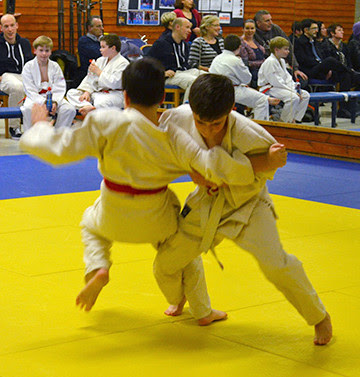3 short stories on the same theme. Can you figure them out?
Last Monday evening, after Karate class, we sat in Zazen from 8:00 to 8:30. While we were there, a thunderstorm broke up. Before our Dharma discussion, I went outside to close the cars windows. And there, no Mugen (my dog). The furry little bastard (one of his nicknames - another one is Houdini) was gone. Jumped through the window. So, no Dharma discussion that night. We all go out in the dark and rain, trying to find him, no Mugen. I roamed the neighbourhood until 11:00. Still no dog.
Tuesday morning, after a short and agitated night, I asked Gerri to take over the Tai Chi class while I went looking for him.As I had almost given up, my phone rang, he was at the fire station, right beside the Dojo... I went there, thanked the firefighters (great guys) and took him back home with me.
Two monks traveling on a trail arrived at a river. Waters were higher than usual. On the bank, a young woman was hesitating and asked the younger of the two monks to help her cross. He exclaimed, 'Don't you see that I am a monk ? I took a vow of chastity and cannot touch you for women are unclean'
'I require nothing bad from you, but simply to help me to cross this river,' replied the young woman with a little smile.
- "I am sorry. I can do nothing for you," said the embarrassed young monk.
- "Don't worry about the vows" said the elderly monk. "Climb on my back, I'll carry you to the other side".
Having reached the other bank, the old monk put down the young woman and she thanked him with a broad smile. She went her own way, and the monks theirs.
After a while, the young monk who could not stand it anymore and said, ' How could you dare carry this unclean woman on your back? It's against our rules.'
'This young woman needed help and I carried her down to the other bank. You didn't carry her at all, but she is still on your back,' replied the older monk.
Once upon a time in Thailand, a Lady saw a Monk sitting in meditation under the sun in the middle of summer. The Monk was very thin, he looked starved and sickly, sunburnt and bitten by mosquitoes and other pests, but there was a saintly aura about him as he sat beautifully and still in the middle of this ordeal.
Impressed by his dedication, the Lady invited the Monk to rest at her house. She served him food and tea and he ate and rested for several days. The Lady and him spent lots of time talking about the teachings and practice of Buddhism, and the Lady was thoroughly enjoying his company
She built for him a small temple and a shed at the top of a hill she owned, so he could practice in decent conditions and would not have to beg his way out in the world. Everyday, a servant would bring him some food. The Monk got better. At times, the Lady would come speak to him and he would preach the Dharma to her.
After several month, the Lady's Granddaughter came to visit her. She was lovely. There was a special bond between the two ladies, they both were beautiful, charming and generous, and deeply loved each other. As she thought the Monk would also enjoy meeting such a charming and lovely young girl, the Lady asked her grand daughter to bring the Monk his food.
That evening, when the Lady visited the hermitage, she asked the Monk how he had felt about her beloved granddaughter.
The Monk answered : "An other walking sack of shit."
The Lady told him : "If are not able to see and appreciate beauty when it is there for you to see, you don't deserve it. Leave now !"
The next day she burnt the hermitage.











